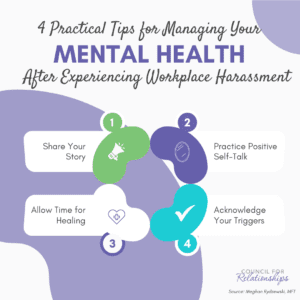Women’s Psychological Safety in the Workplace
In an era where women’s psychological safety in the workplace has increasingly come to the forefront, it’s crucial to shine a light on the silent battles many face daily. This blog delves into the struggles against workplace harassment and its profound impact on mental health.
Amidst Women’s History Month, we underscore the importance of creating an environment where every woman feels secure and respected. From personal reflections on encountering harassment to offering tangible strategies for managing mental health aftermath, this piece serves as a beacon of hope and empowerment. It explores the psychological effects, the importance of speaking up, and the healing journey.
Join us in understanding, supporting, and advocating for a safer workplace for all women, where their well-being is prioritized and their voices are amplified. Together, let’s navigate through the challenges and champion the cause of psychological safety, ensuring a more inclusive and supportive work environment for everyone.
The Impact of Workplace Harassment on Mental Health
I’m extremely passionate about women’s safety in the workplace. Of course, I want everyone to feel safe in the workplace, but highlighting women’s safety is extremely important for Women’s History Month.
Understanding the Psychological Effects
You never think it will happen to you until it does, and then what do you do from there? Do you talk to your friends? Do you quit the job you enjoy so much? Do you report it? Or do you hope it just stops one day?
These are all the questions that ran through my mind as a young woman. You tend to ask yourself different questions, such as, what could I have done differently? Or you might downplay your experience and talk yourself out of your feelings.
What I am certain of is that it affects your mental health in different ways, big or small. Women’s experiences of sexual harassment are associated with “reductions in their professional, psychological, and physical health.”
Taking care of yourself throughout this process is extremely important.
Practical Tips for Managing Your Mental Health After Experiencing Workplace Harassment
Here are a few tips for managing your mental health if you or someone you know experiences an unsafe workplace.
Speak Up and Share Your Story
First, it is important to speak up. Naming what happened and telling someone you trust is very important. Telling your story gives you power and helps you process the situation. It removes the power from the abuser instead of keeping it a secret. Talking about it with a trusted person, a friend, parent, family member, or therapist can help process this on different levels.
Practice Positive Self-Talk
Next, practice positive self-talk and remind yourself that it isn’t your fault. During stressful times, we tend to look inward and question ourselves about what we could have done differently to prevent the harassment from taking place. Was I too friendly? How did I play a role in this? Reminding yourself that it wasn’t your fault and surrounding yourself with people who boost you up and support you throughout this process is important. Knowing that you don’t have to face it alone can provide you with some relief.
Identify and Acknowledge Your Triggers
Also important is remembering to acknowledge your triggers. Going throughout your daily life and something that brings you back to that environment or reminds you of that person can be quite challenging. Having nightmares or flashbacks can also be unsettling and can cause distress. Processing this with a therapist can be crucial. Reminding yourself that you are safe and practicing grounding techniques are crucial during this process. Starting with your feet on the ground and working your way up through your body, getting in touch with yourself and your safety can help you feel grounded.
Allow Time for Healing
Lastly, allow yourself time and space to heal. Processing this situation can take time and be quite difficult. It can be painful, and there is likely shame or embarrassment surrounding how long it might take. This healing process is not linear, and it is okay to have good and bad days.
Conclusion: Empowering Women’s Psychological Safety in the Workplace is a Non-Negotiable
We create a safe work environment by fostering a culture of respect and understanding. The journey towards healing and resilience after experiencing workplace harassment is deeply personal and varied. By sharing stories, practicing positive self-talk, identifying triggers, and allowing time for healing, we can support one another in navigating these challenging waters.
Remember, prioritizing women’s psychological safety isn’t just about individual well-being; it’s about building stronger, more compassionate workplaces where everyone can thrive. This conversation is a step towards dismantling the structures that perpetuate harassment and towards a future where respect, dignity, and safety are the bedrock of every professional environment.
Let us all commit to being allies, advocates, and active participants in this vital movement. Together, we can make a difference and ensure every woman’s workplace is safe and empowering. Your voice matters, your experiences are valid, and your psychological safety is non-negotiable.
I hope you know that your voice is important and that you are believed. #metoo
About Marriage & Family Therapist Meghan Rydzewski
Meghan Rydzewski, MFT, is a Staff Therapist at Council for Relationships who specializes in, among other areas, LGBTQ+ issues, trauma, and women’s issues. Contact her to book a therapy appointment.
Meghan sees individuals, couples, and families virtually and in person in Pennsylvania and New Jersey. Tell your family and friends to reach out to her for support.
Prioritizing your mental health is essential. Let CFR’s over 85 individual, couples, and family therapy experts help you build thriving relationships and communities. See our Therapist & Psychiatrist Directory for CFR therapists or psychiatrists near you.
If this is an emergency, please dial 9-1-1.
More Blogs on Mental Health
Did you enjoy this blog? Our expert therapists, psychologists, and psychiatrists offer much more to explore! Check out the CFR Expert Voices blog for great mental and emotional health advice and insight. To get first access to our Expert Voices blog, join our mailing list!
Identity Shift in Motherhood: Navigating New Challenges & Rediscovering Yourself
Taking Care of Yourself or a Loved One After a Breast Cancer Diagnosis


